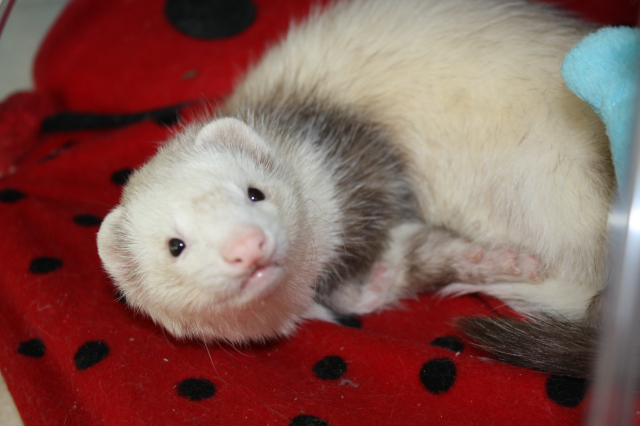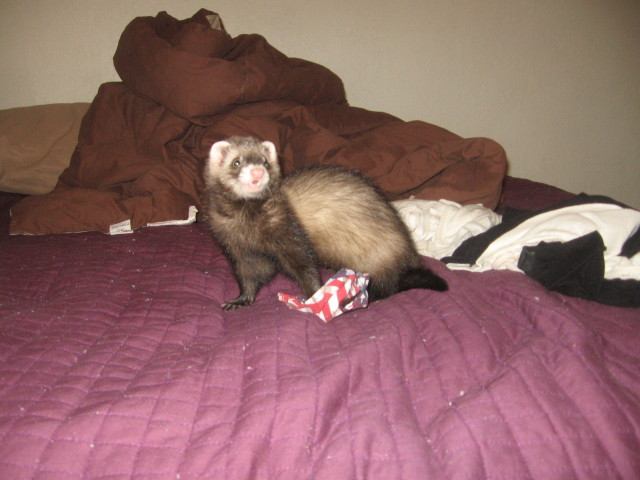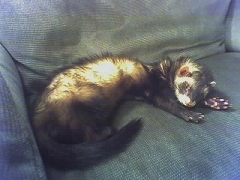QuestionQUESTION: Please tell Miss Jacqie that my question was NOT a homework question. I'm 41! That was a very rude answer and I noticed she's "maxed out" her questions right after that little comment to me.
If she doesn't know the answer, she should just admit it. I want answers, not smart aleck responses.
ANSWER: I am sorry you had a bad experience with Jacquie. She is one of the most knowledgeable and in my opinion the best expert to ask for advice on this site. I have never known her to be rude and her answers are usually very detailed and through.
Please do not take her "maxed out" status offensively. It is an automatic setting so she does not receive too many questions in one day. Jacquie not block your or intentionally prevent your reply. I can only answer one question per 24 hours due to my strict time limitations as a full time graduate student. Please remember that is a free service to help ferret owners all over the world. Us experts do not receive a dime for our efforts or time. The knowledge that we are helping fellow pet lovers is compensation in itself =D
I am unsure of your question or her response since it must be set to private. In this way I cannot tell the nature of your inquisition. Once she is no longer has a "maxed out" status, please ask her to elaborate on your question. She is a very kind person and meant no offense.
-Cindy P.
---------- FOLLOW-UP ----------
QUESTION: Thanks for your response. Here is what I originally asked her:
"How do ferrets absorb nutrients such as antioxidants? There have been experiments on ferrets (one involving beta carotene, that I know of) and since we know they can't process fiber, was it the juice of vegetables given to these ferrets? If so, how does their system absorb it in the small intestine?
Vegetable juices are low in sugars but I would think they are still too high for a ferret's ability to process them.
How does one get the nutrient into the ferret without causing an insulinoma issue?"
Her email response she sent to me was:
"Sorry, but I don't answer homework questions.."
The insinuation being that since it was a technical question, I must be some student looking for answers to my homework. I am definitely not a student!
With there being no way for me to respond by email to her quip and the fact that she maxed out her box immediately after she sent this to me, makes it an obvious jab.
I thought my question was pretty straight-forward. If someone can't answer this question, I completely respect that. My own VET couldn't even answer it.
My hopes are that someone somewhere on the internet knows the answers and I had to start somewhere (asking the question), so I asked her.
I know zip/nada about biology, much less animal biology and I have a ferret with an incurable cancer so I'm really having to wing it about what to do for him nutritionally.
Animal dietitians are difficult to find, especially those who specialize in ferrets.
My search will continue, the internet is a big place. Thank you for letting me speak my piece.
AnswerThat is an excellent question, but I can see why it might be difficult to answer without access to the proper sources. I am a veterinary student, although I do not like to flaunt it around. I fear some will ask me questions I cannot answer or diagnose as I am not a doctor yet. I have access to the VIN (Veterinary Information Network), which is a very useful if an extremely scientific source. It came in handy find what little I could about ferrets and antioxidants.
As you already know, there is not a whole lot of information regarding topic. Only one article mentions anything relevant, and it is very limited. I came across the study you mentioned regarding antioxidants and ferrets. It has an impossibly long title. "The effects of combined antioxidant (beta-carotene, alpha-tocopherol and ascorbic acid) supplementation on antioxidant capacity, DNA single-strand breaks and levels of insulin-like growth factor-1/IGF-binding protein 3 in the ferret model of lung cancer." by Yuri Kim, Fuzhi Lian, Kyung-Jin Yeum, etc in the "International Journal of Cancer" (May of 2007). The study tests the effect of beta-carotene, alpha-tocopherol and ascorbic acid on lung cancer, but does not include any information on the GI tract or nutrition. Unfortunately, it does not test the digestibility of nutrients within the digestive tract nor the affect on anything besides a specific form of cancer. However, the results did show slight positive effects for the condition. This model is used as animal research for the human disease.
The second article was slightly more promising. Ferrets are unable to absorb much of the protein from plants in the intestines as well as lack the ability to digest the fiber. Below is the relevant excerpt:
"Because of the short GI tract and the poor absorption of nutrients, ferrets require a diet that is highly concentrated with FAT as the main source of calories (energy) and highly digestible MEAT-BASED PROTEIN. This would match the basic composition of a prey animal, not excluding the essential vitamins and minerals it also contains. Ferrets should never be fed carbohydrates (such as vegetable, fruit or grains) as the main source of energy in the diet. Ferrets cannot digest fiber, as is found in some vegetable and fruit sources. If there is a significant amount of fiber in the diet it serves to lower the nutritional value of the food. As mentioned, ferrets need a highly digestible meat-based protein in the diet. Vegetable protein is poorly utilized. Ingestion of excess vegetable protein can be associated in ferrets with such diseases as bladder stones, poor coat and skin disease, eosinophilic gastroenteritis (wasting, diarrhea, and ulcerations of the skin), poor growth of kits and decreased reproduction. Dog food and vegetarian-type pet foods are completely inappropriate for use in ferrets because of the high level of vegetable protein and fiber. The bottom line is that ferrets use fat for energy, not carbohydrates, and they need a highly digestible meat-based protein, not vegetable protein."
SMALL MAMMAL HEALTH SERIES
Susan Brown, DVM
"Care of Ferrets"
Date Published: 3/20/2001
There is no research at this point to offer any advice on antioxidants or vegetable matter extracts Not only do ferrets lack the ability to digest vegetables, but also seem to have far less absorption of plant proteins. Of course, there are many other types of antioxidants. One example is vitamin E (tocotrienol). This is an oil soluble vitamin that can be extremely toxic if given too much or too often, but is still necessary to maintain good health. Any high quality food would provide ample amounts of this vitamin without overdose. Provided you feed a balanced nutritional diet, there should be no need to supplement vitamin E.
I hope this information proves useful to you. I wish I could tell you more, but there simply are not enough studies or material on this subject. If you happen to discover any further information, please let me know! It is a learning endeavor for me as well.
Thank you for your time.
-Cindy P.
EDIT- I managed to find the full text article. I was relying on the abstract (Since there was a charge for the full thing on VIN)
If you do not already have it, go to: http://www3.interscience.wiley.com/cgi-bin/fulltext/114110095/HTMLSTART

 My 7 yr old ferret is obsessively chewing her toys
Question
Cecilia and her babies
Hi,
My ferret Ce
My 7 yr old ferret is obsessively chewing her toys
Question
Cecilia and her babies
Hi,
My ferret Ce
 Female Behavior Issues
QuestionQUESTION: I have had Ryoko, my female ferret, f
Female Behavior Issues
QuestionQUESTION: I have had Ryoko, my female ferret, f
 Shes so nippy
Question
Delilah
My boyfriend got me the cutest
Shes so nippy
Question
Delilah
My boyfriend got me the cutest
 ferret ear problems
Question
I cant wait to get he
Hi Cindy!
I have a ferre
ferret ear problems
Question
I cant wait to get he
Hi Cindy!
I have a ferre
 SWOLLEN FEMALE PARTS
QuestionSmokey napping
QUESTION: Hello, I have a
SWOLLEN FEMALE PARTS
QuestionSmokey napping
QUESTION: Hello, I have a